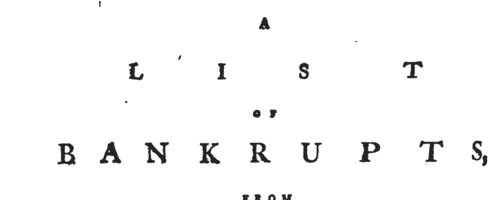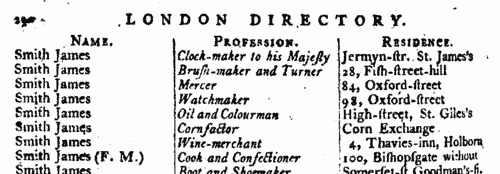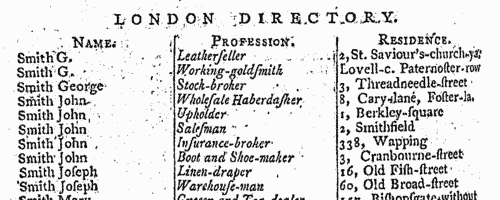Macnaughton Surname Ancestry ResultsOur indexes 1000-1999 include entries for the spelling 'macnaughton'. In the period you have requested, we have the following 65 records (displaying 1 to 10): Single Surname Subscription | | | Buying all 65 results of this search individually would cost £308.00. But you can have free access to all 65 records for a year, to view, to save and print, for £100. Save £208.00. More... |
These sample scans are from the original record. You will get scans of the full pages or articles where the surname you searched for has been found. Your web browser may prevent the sample windows from opening; in this case please change your browser settings to allow pop-up windows from this site. Scottish litigants, rebels and cautioners
(1585-1592)
The Privy Council of Scotland exercised a superior judicial authority in the kingdom, and consequently received and dealt with a constant stream of petitions, as well as dealing with the internal security of the state. This register of the council from 1 August 1585 to 31 July 1592, in the reign of king James VI, was edited by David Masson, and published under the direction of the Lord Clerk Register of Scotland in 1881. Some of the individuals mentioned are the complainants, those of whom they complained, and the sureties on both sides: at this period, some of the complainants are alleging serious attacks, often of a feuding nature. Many of the bonds entered into by the cautioners are promises to keep the peace towards such enemies. Failure to answer to the council when summoned was a serious contempt, leading to being denounced a rebel, with serious consequences. But 'horning' was also used in the pursuit of debts: there was no imprisonment for debt in Scotland, but a creditor could have an obstinate debtor ordered, in the sovereign's name, to pay what was due, failing which, the debtor could be put to the horn, denounced as a rebel, and imprisoned as a rebel. The main text (to page 774) is from the Acta Secreti Concilii, containing the minutes of the Privy Council, with intermixed Acta Proper (political edicts), Decreta (judicial decisions), Acta Cautionis (acts of caution) and Bands (registration of bonds). After that are printed some miscellaneous Privy Council documents from the same years: additional acts of caution (775-778); ordinances and acts anent the Borders and the North (779-814); and miscellaneous privy council papers (815-834). The sources most productive of names, the Acta Cautionis and Registration of Bands, are also the most repetitive in form, and are not transcribed verbatim and literatim: nevertheless, one of the editor's rules was for 'All proper names and names of places occurring in the originals to be preserved in the abstracts without exception, and in the exact original spelling.'
MACNAUGHTON. Cost: £4.00.  | Sample scan, click to enlarge

| Scottish litigants, rebels and cautioners
(1592-1599)
The Privy Council of Scotland exercised a superior judicial authority in the kingdom, and consequently received and dealt with a constant stream of petitions, as well as dealing with the internal security of the state. This register of the council from August 1592 to May 1599, in the reign of king James VI, was edited by David Masson and published under the direction of the Deputy Clerk Register of Scotland in 1882. The publication brings together the contents of the principal register (Acta Secreti Concilii) with acts and bands (bonds) of caution (surety) from the registers called Acta Cautionis (pp 561-730); Acts and Ordinances relating to the Borders and the North (731-748); and Miscellaneous Privy Council Papers (749-769). Many of the individuals mentioned are the complainants, those of whom they complained, and the sureties on both sides: at this period, many of the complainants are alleging serious attacks, often of a feuding nature. Many of the bonds entered into by the cautioners are promises to keep the peace towards such enemies. Failure to answer to the council when summoned was a serious contempt, leading to being denounced a rebel, with serious consequences.
MACNAUGHTON. Cost: £4.00.  | Sample scan, click to enlarge

| Scottish litigants, rebels and cautioners
(1610-1613)
The Privy Council of Scotland exercised a superior judicial authority in the kingdom, and consequently received and dealt with a constant stream of petitions, as well as dealing with the internal security of the state. This register of the council from July 1610 to February 1613, in the reign of king James VI, was edited by David Masson and published under the direction of the Deputy Clerk Register of Scotland in 1889. The publication starts with the Acta and Decreta, a chronological consolidation of material from Acta Secreti Concilii proper, the Decreta, the Book of Commissions, the Book of Sederunts, the Minute Book of Processes, and The Book of the Isles. There is then a section of Royal and Other Letters (pp. 565-644); then acts and bands (bonds) of caution (surety) from the registers called Acta Cautionis (pp. 647-690); and Miscellaneous Privy Council Papers (693-746). Many of the individuals mentioned are the complainants, those of whom they complained, and the sureties on both sides: at this period, many of the complainants are alleging serious attacks, often of a feuding nature. Many of the bonds entered into by the cautioners are promises to keep the peace towards such enemies. Failure to answer to the council when summoned was a serious contempt, leading to being denounced a rebel, with serious consequences.
MACNAUGHTON. Cost: £4.00.  | Sample scan, click to enlarge

| Liegemen and Traitors, Pirates and Spies
(1627)
The Privy Council of Charles I was responsible for internal security in England and Wales, and dealt with all manner of special and urgent matters
MACNAUGHTON. Cost: £4.00.  | Sample scan, click to enlarge

| Official Papers
(1660-1661)
The State Papers Domestic cover all manner of business relating to Britain, Ireland and the colonies, conducted in the office of the Secretary of State as well as other miscellaneous records. The records of these years immediately after the restoration of the monarchy include many petitions to Charles II for offices and possessions lost during the Civil War.
MACNAUGHTON. Cost: £4.00.  | Sample scan, click to enlarge

| Bankrupts
(1789)
A list of bankrupts in England and Wales from 1 January to 30 June 1789 giving full name (surname first), address and occupation, and the date of bankruptcy.
MACNAUGHTON. Cost: £4.00.  | Sample scan, click to enlarge

| Traders and Merchants in London
(1791)
The Universal British Directory was published in five volumes, starting in 1791. The professions included in the London section are very diverse: the addresses are mostly from central London. Some are marked 'F. M.', meaning Freeholder of Middlesex.MACNAUGHTON. Cost: £6.00.  | Sample scan, click to enlarge

| Traders and Merchants in London
(1797)
The Universal British Directory was published in five volumes, starting in 1791. The professions included in the London section are very diverse: the addresses are mostly from central London. The publication of the provincial volumes took several years, so this London supplement was added, compiled about 1797.MACNAUGHTON. Cost: £6.00.  | Sample scan, click to enlarge

| London Master Bootmakers and Shoemakers
(1812)
At a general meeting of the master boot- and shoemakers of the cities of London and Westminster held at the British Coffee House, Cockspur Street, 24 February 1812, it was unanimously resolved 'That we feel deeply concerned at the present disturbed state of the trade, occasioned by our workmen having unjustly and impoliticly demanded a considerable advance of wages. We therefore take this opportunity of declaring our utter inability to comply with so unreasonable and unwarrantable a demand, for which there does not appear the smallest pretence or plea of necessity, but would on the contrary, if complied with, be productive of the greatest injury to them and us.
'2dly. Being, however, fully persuaded that this injudicious and improvident transaction is in reality disapproved of by the sober, industrious, and most discerning of the workmen, we avail ourselves of this occasion to request those who have not left their employment, to continue at their work; and also those who have been incautiously and inconsiderately misled, to return to their respective employments, confidently relying on our support and protection.' The list of those present in most cases gives only the surname.MACNAUGHTON. Cost: £6.00.  | Sample scan, click to enlarge

| London Traders
(1814)
The fifteenth edition of The Post-Office Annual Directory includes this 'List of More than 17,000 Merchants, Traders, &c. of London, and Parts Adjacent', arranged alphabetically by surname, with trade in italics, and address.MACNAUGHTON. Cost: £4.00.  | Sample scan, click to enlarge

|
Research your ancestry, family history, genealogy and one-name study by direct access to original records and archives indexed by surname.
|












